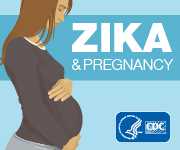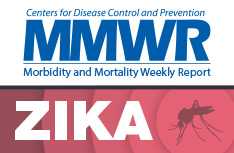Patient Counseling
Travel Recommendations
CDC recommends that pregnant women not travel to areas with risk of Zika. If a pregnant woman is considering travel to one of these areas, she should talk to her healthcare provider. If she travels to an area with risk of Zika, she should be counseled to strictly follow steps to prevent mosquito bites and sexual transmission of Zika during the trip. All travelers should continue to take steps to prevent mosquito bites for at least 3 weeks after they return home to prevent spreading Zika to uninfected local mosquitoes. See CDC’s Travelers’ Health Zika webpage for more information on international travel precautions. See Areas with Zika for recommendations for the United States.
Preventing Sexual Transmission
Pregnant women whose sexual partners have traveled to or lived in an area with risk of Zika should use condoms every time they have sex (vaginal, anal, and oral sex, and sharing of sex toys) or not have sex during the entire pregnancy. For more information, see Zika and Sexual Transmission.
Pretest Counseling
If Zika testing for a pregnant woman is indicated, healthcare providers should provide pretest counseling. In particular, healthcare providers should
- Provide the patient with information on the complexity of Zika testing, including the following points:
- More than one Zika test may be required before a final result is determined.
- Understanding test results can be challenging.
- Previous exposure to Zika virus could affect test results during pregnancy.
- Discuss each type of Zika test with the patient.
- Discuss with patients what test results could mean for their pregnancy.
Educational materials and supporting clinician guides are available below.
Note on the US-Mexico Border
The United States-Mexico border region is unique in that many people move fluidly and regularly (for example, daily, weekly) between the two countries to live, work, attend school, socialize, and seek medical care. Those who live in the border area may not regard movement between border cities or states as “travel.” This context should be considered when asking women in this area about travel history and potential exposure to Zika.
Zika virus transmission has been reported in Mexico, and the mosquitoes that spread Zika are found on both sides of the United States-Mexico border. Healthcare providers caring for pregnant women who live near the border should assess their patients’ (and their patients’ partners’) travel history, including frequency of border crossing and length of stay in Mexico. For pregnant women who travel across the border regularly, healthcare providers should follow CDC’s guidelines, including testing recommendations as well as guidance from their respective state and local health authorities. Men who travel across the border and have a pregnant partner should not have sex with their partner or should use condoms for the entire pregnancy. Both men and women who live in the border region who are planning pregnancy should be counseled about Zika risk based on the most recent information on mosquito activity and Zika cases from the state and local health departments.
Patient Materials
Zika Virus Testing for Pregnant Women Living in an Area with Zika
Zika Virus Testing for Any Pregnant Woman Not Living in an Area with Zika
For Pregnant Women: A Positive Zika Virus Test: What does it mean for me?
What You Should Know about Zika Virus Testing: For Asymptomatic Pregnant Women with Ongoing Exposure to Zika
What You Should Know about Zika Virus Testing: For Symptomatic Pregnant Women with Exposure to Zika
What You Should Know about Zika Virus Testing: For Asymptomatic Pregnant Women with Recent Exposure to Zika
Clinician Resources
Zika Testing Algorithm for Symptomatic Pregnant Women
Zika Testing Algorithm for Asymptomatic Pregnant Women
Zika Screening Tool for Pregnant Women
Clinician Guide: For Asymptomatic Pregnant Women with Ongoing Exposure to Zika
Clinician Guide: For Asymptomatic Pregnant Women without Ongoing Exposure to Zika
Clinician Guide: For Pregnant Women with Symptoms of Zika
Zika Test Result Interpretation Table
Counseling Pregnant Travelers
More Information
- UPDATE: Interim Guidance for Health Care Providers Caring for Pregnant Women with Possible Zika Virus (MMWR, July 24, 2017)
- HAN Advisory: Prolonged IgM Antibody Response in People Infected with Zika Virus: Implications for Interpreting Serologic Testing Results for Pregnant Women (May 5, 2017)
- HAN Advisory: CDC Guidance for Travel and Testing of Pregnant Women and Women of Reproductive Age for Zika Virus Infection Related to the Investigation for Local Mosquito-borne Zika Virus Transmission in Brownsville, Cameron County, Texas (December 14, 2016)
- HAN Advisory: CDC Updates Guidance for Pregnant Women and Women and Men of Reproductive Age for Zika Virus Infection Related to the Ongoing Investigation of Local Mosquito-borne Zika Virus Transmission in Miami-Dade County, Florida (October 19, 2016)
- Interim Guidance for Preconception Counseling and Prevention of Sexual Transmission of Zika Virus for Persons with Possible Zika Virus Exposure – United States, September 2016 (MMWR, Sept. 30, 2016)
- AAP: Zika-Related Psychosocial Support Resources
- Page last reviewed: July 24, 2017
- Page last updated: August 30, 2017
- Content source:





 ShareCompartir
ShareCompartir